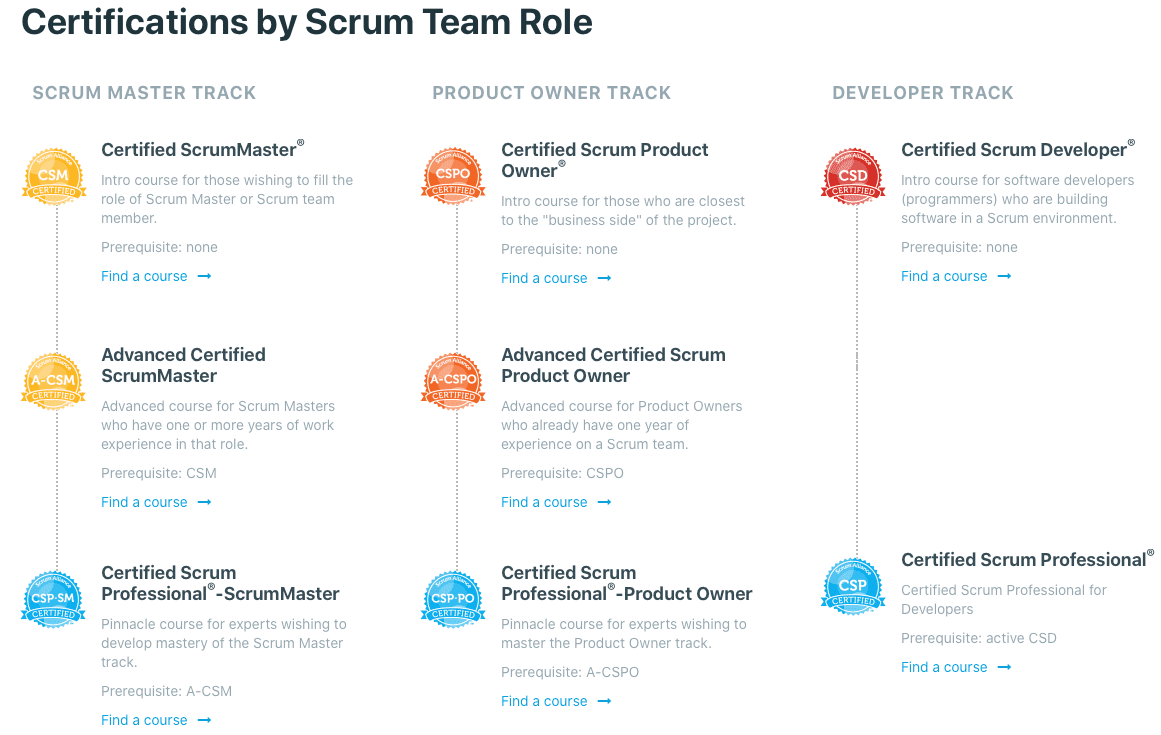A much-debated topic for decades in the product development industry is, “What’s the value of a certification?” Many organizations argue, and rightly so, they are more interested in building products that meet customer needs rather than pursuing certifications. While certifications don’t guarantee product success, the path to gain this knowledge through certification can be immensely valuable for the organization, individuals, teams, and leaders.
What is a CSM certification?
A Certified ScrumMaster (CSM) certification demonstrates expertise in the Scrum framework, equipping professionals with the skills to lead agile teams, manage scrum practices, and foster collaboration. Through this certification, you’ll gain a deep understanding of key Scrum roles, events, and artifacts, empowering you to improve team productivity and embrace agile principles.
Although several certifications exist in many fields and areas of interest, each with its own merits, this blog will discuss the value of scrum certification.
What are the available scrum certifications?
The Scrum Alliance recently refined the scrum certification path outlining three primary tracks, one for each scrum role:
They also offer “Guide Level” certifications for those interested in pursuing more advanced scrum coaching or training certifications.
The certifications help people distinguish themselves as scrum and agile practitioners.

What is the value of a scrum certification?
Certifications create value at four different levels: personal, scrum team, organization, and leadership.
Personal value
Scrum certified individuals find that scrum certifications open career doors. Today, with the help of technology, screening tools scan resumes looking for keywords. They search for Certified Scrum Master (CSM), Certified Scrum Product Owner (CSPO), Certified Scrum Developer (CSD), Certified Scrum Professional (CSP), etc. During the screening process, fewer and fewer resumes are read by humans, so the certifications help agile candidates rise to the top. The reality is that certifications set candidates apart, drawing a line between those with them and those without.
Many organizations want to promote individuals with scrum certifications because the certification adds rigor to whatever real-world experience they have. While the value of their contribution is the primary reason for the promotions, the certification informs the promotion decision. Organizations want people who understand agility and can demonstrate their understanding, as evidenced by a certification.
As for improving individual effectiveness, scrum training and certifications help individual team members to better practice the values and principles of the agility framework. Individuals transform how they work to become more focused, committed, open, respectful, and courageous. These are all qualities reinforced with scrum training and certification. Certifications create personal clout and credibility, opening doors of opportunity.
Scrum team value
Scrum certifications, combined with the team’s learning journey throughout the certification training, also provide value for the team. Teams who train and certify together learn to collaborate better. By having everyone on the same page through their proven, common understanding and validation of scrum reduces misunderstandings and anti-patterns.
It validates that all team members mastered the course material leading to alignment and consistency in approaching problems and challenges. Certifications serve as gauges for teams’ career progression and agile maturity. High performing scrum teams are well trained and certified.
Certifications also enable the team to obtain clarity and understanding of each member’s role. Scrum creates a healthy tension between the product owner, development team, and scrum master. That tension is critical for building quality products on time. The certification confirms to the rest of the team that each person knows their role and commits to performing it with distinction.
Certifications can be a catalyst for the teams to become high performing. With the fundamentals understood, the team’s practice of learning leads to better backlogs, planning, standups, sprint reviews, retrospectives, and, most importantly, product increments.
Certifications put teams on a path to continually improve mastery of agile techniques, enhancing products, performance, and job satisfaction. A certification based on experience and training puts the team on the right path. It ensures they get their start directly from someone who has industry-recognized knowledge and expertise, making them more likely to avoid common pitfalls.
Organizational value
Scrum certifications also deliver value for the organization. Patrick Lencioni, from his book “The Five Dysfunctions of a Team” said:
“If you could get all the people in an organization rowing in the same direction, you could dominate any industry, in any market, against any competition, at any time.”
Scrum certifications can also be vital for helping organizations to row in the same direction. Certifications should be evidence that people know how to row. By aligning on agile standards such as Scrum Alliance or Scrum.org or Scrum Inc, etc. brings consistency and value. The certification becomes a measuring tool for organizational commitment to agility. Training and certifications generate the momentum necessary for organizations to make necessary cultural shifts to achieve agile transformation.

Leadership value
Lastly, scrum certifications create value for leaders. A leader who can say, “I got certified just as you. I’m at that level. We’re in this together,” sends a message of their commitment to becoming an ambassador of change. People in the trenches have more confidence following certified leaders.
Certified leaders align better with the teams. We’ve seen new leaders joining organizations without these certifications, and the disruption to the team was costly to the product, pace, and morale. One leader even tried to throw out the agile values and principles, telegraphing to everyone he didn’t understand their importance or purpose. Team members began leaving the organization.
Finally, certified leaders are crucial for maximizing organizational effectiveness. The constraints of the environment impact a team’s velocity. Certified leaders understand this and become more aware of the constraints. The learning through certification and training provides them the ability to recognize limitations, so they can remove them, and the organization can thrive.
This coach’s experience
As someone who’s earned several scrum certifications, I have personally benefited greatly. Immediately after getting my CSM and CSPO, I was asked by my organization to become the first scrum master for a team. The role was a great opportunity, leading to experiences I wouldn’t have had otherwise. The certifications influenced my boss’ decision for my new assignment.
Later, after earning my CSP, I had new opportunities available to coach organizations at an enterprise level. The CSP prompted me to start acting like a thought leader by speaking and writing. It also moved me out of my comfort zone through community involvement and service. It created the opportunity for me to read books and take courses I might not have considered before. My clients expect me to have the experience to support them and the certifications, which validate my qualifications.
When my first team started, we all participated in the CSM and CSPO classes together. The certification became our unspoken sign of commitment to using scrum together. The lure of certification during training helped us to wring every drop out of the class as a team. Scrum certification became a requirement of new team members as they joined our team. Moving to scrum was a difficult transition for our organization. Our success in doing so was attributable in part to our training and certifications.
Likewise, many of the organizations I’ve helped as an agile coach invested in scrum training. Those pursuing certification for their employees illustrated they valued employee contribution and were ready to invest in them.
They knew that the certification would open doors for their people, perhaps even outside of their organization, but they still chose to invest in building knowledgeable, talented people. Once certified, those people caught the new vision of what their organization could become and rallied to improved performance. Loyalty for the organization grew.
On the other hand, the organizations that did not invest in certifications found their transformations more difficult and costly. The few trained people never really took it seriously, and subtly felt that the organization wasn’t willing to invest in them. They were then less inclined to help the organization move forward.
The value of certifications is a cornerstone for all stakeholders
While a scrum certification does not guarantee team, product, or even organizational success, it does provide value. The value translates to motivated and aligned employees who feel supported in their career development. The value is also visible in teams who commit to excellence and high performance. Organizations benefit from certification momentum to culturally shift. And leaders express value by wearing their “certification badge” proudly and using it to enable agility. Scrum training and certifications are cornerstones for building better careers and high performing teams, organizations, and leaders.
Interested in scrum certification? Explore our upcoming classes today.


